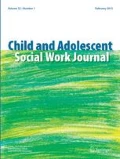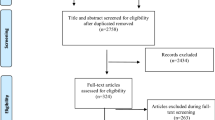Abstract
Children, youth, and families served by child welfare professionals should be provided with services that are reasonably well-supported by scientific evidence, when such knowledge exists. A number of clearinghouses and databases have been created in recent years that list a wide array of child welfare, mental health, substance abuse, family, and educational services, provide a critical appraisal of the levels of evidence available for each such service, and rates this evidence. Some interventions are said to possess strong evidence of their effectiveness and can be called research supported. Others are poorly researched and some have been shown to actually be harmful. This article describes a summary of these major databases and clearinghouses evaluating programs and practices for potential use in child welfare. Links are provided to assist child welfare professionals in locating these research supported psychosocial interventions.
Similar content being viewed by others
References
American Psychological Association. (2010). Code of ethics. Washington DC: American Psychological Association. http://www.apa.org/ethics/code/.
Behavior Analyst Certification Board. (2016). Professional and ethical compliance code for behavior analysts. Denver: Behavior Analyst Certification Board. http://bacb.com/wp-content/uploads/2016/03/160321-compliance-code-english.pdf.
Carroll, M. & Scott, R. (2015). Results-oriented accountability program plan. Tallahassee: Department of Children and Families, Office of Child Welfare. https://www.dcf.state.fl.us/programs/childwelfare/docs/2015LMRs/Results-Oriented%20Accountability%20Plan.pdf.
Christopherson, E. R., & Mortweet, S. L. (2001). Treatments that work for children: Empirically supported strategies for managing childhood problems. Washington, DC: American Psychological Association.
Dallam, S., & Silberg, J. L. (2016). Recommended treatments for “parental alienation syndrome” (PAS) may cause children foreseeable and lasting psychological harm. Journal of Child Custody, 13, 134–143.
Lilienfeld, S. O., Lynn, S. J. & Lohr, J. M. (Eds.), Science and pseudoscience in clinical psychology (2nd ed.). New York: Guilford Press.
Myers, L. L., & Wodarski, J. S. (2014). Using the Substance Abuse and Mental Health Services Administration (SAMHSA) evidence-based practice kits in social work education. Research on Social Work Practice, 24, 705–714.
Nathan, P. E. & Gorman, J. M. (Eds). (2007). A guide to treatments that work (3rd ed.). New York: Oxford University Press.
National Association of Social Workers (1996). Code of ethics. Washington, DC: National Association of Social Workers.
Obama, B. (2015). Using behavioral science insights to better serve the American People. (c.f., https://www.whitehouse.gov/the-press-office/2015/09/15/executive-order-using-behavioral-science-insights-better-serve-american.
Olfman, S. (Ed.). (2015). The science and pseudoscience of children’s mental health; Cutting edge research and treatment. Santa Barbara: Praeger.
Roth, A. & Fonagy, P. (2005). What works for whom: A critical review of psychotherapy research (4th ed.). New York: Guilford Press.
Rubin, A. & Parrish, D. E. (2015). Locating credible studies for evidence-based practice. In K. Corcoran & A. E. Roberts (Eds.). Social workers’ desk reference (3rd ed., pp. 1205–1214). New York: Oxford University Press.
Thyer, B. A., Babcock, P., & Tutlwiler, M. (2016). Locating and evaluating research-supported interventions in child welfare. Technical report prepared for the Florida Department of Children and Families, funded by the Florida Institute for Child Welfare, College of Social Work, Florida State University.
Thyer, B. A., & Pignotti, M. (2015). Science and pseudoscience in social work practice. New York: Springer.
Thyer, B. A., & Wodarski, J. S. (Eds.). (2007). Social work in mental health: An evidence-based approach. New York: Wiley.
Funding
This project was funded through a contract with the Florida Institute for Child Welfare.
Author information
Authors and Affiliations
Corresponding author
Ethics declarations
Conflict of interest
All authors declare that they have no conflict of interest.
Ethical Approval
This article does not contain any studies with human participants performed by any of the authors.
Additional information
Portions of this report previously appeared in Thyer, Babcock and Tutweiler (2016).
Rights and permissions
About this article
Cite this article
Thyer, B.A., Babcock, P. & Tutweiler, M. Locating Research-Supported Interventions for Child Welfare Practice. Child Adolesc Soc Work J 34, 85–94 (2017). https://doi.org/10.1007/s10560-016-0478-9
Published:
Issue Date:
DOI: https://doi.org/10.1007/s10560-016-0478-9




